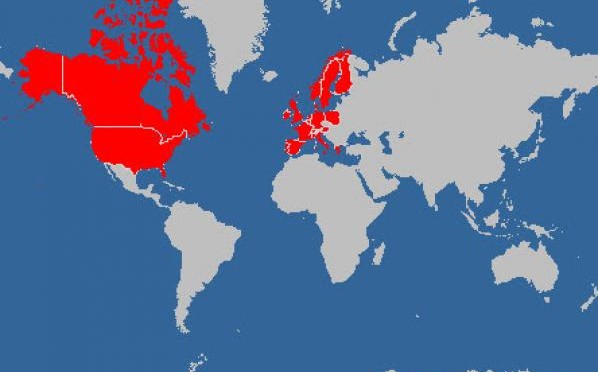John Derbyshire
VDARE
November 8, 2015
How will the mass invasions of European or European-founded nations by the wretched refuse of the Third World’s teeming shores work out? I see five scenarios:
Scenario One: Absorption. All will be well. The migrants, in whatever numbers choose to come, will enrich and energize our tired, aging societies. They will take on our liberal values and become good Europeans, Americans, and Canadians.
Scenario Two: Restriction. Political pressure from their native populations will force receiving nations to stem the flow. Fences will go up, coastal patrols will commence; but those illegals who are in, will be allowed to stay in.
Scenario Three: Rejection. There will be a real uprising of native peoples. Illegals will be deported en masse to their countries of origin.
Scenario Four: Surrender. The native European and European-descended populations, enervated by soft living and psychologically disarmed by globalist propaganda, will yield up their societies to the invaders.
Scenario Five: Fragmentation. Some part or parts of the First World will opt for one of the foregoing scenarios, some other part or parts for a different one.
Allow me to mull over those scenarios and try to assign some probabilities.
Scenario One: Absorption–-the migrants in any quantity happily melting in to the host populations, is the actual stated position of many powerful groups. Libertarian economists, for example, under their standard-bearer The Economist magazine, take this cheerful position. Let them come! The more the better! We need the workers! They’ll pay for our entitlements!
Most Western politicians–Angela Merkel most obviously, Barack Obama, David Cameron, the new Prime Minister of Canada—support this line, to judge from their speeches and actions … or in the case of Cameron, lack of actions. Yes, they’re all on board with Scenario One. Let them come! We will absorb them!
There are two problems with Scenario One, though; one mathematical, one scientific. First problem: It’s innumerate. Second problem: It ignores HBD, human biodiversity.
I’ll deal with HBD another time; I only have one pair of hands. Let me just have a little fun with numbers here.
 Remember that German village, Sumte, 102 souls, having 750 illegals dumped on them? [German Government Tells Village of 102 it Will Get 750 Refugees, By Andrew Higgins, The New York Times, October 31, 2015] That’s a ratio, dumped to dumped-on, of 7.4 to one.
Remember that German village, Sumte, 102 souls, having 750 illegals dumped on them? [German Government Tells Village of 102 it Will Get 750 Refugees, By Andrew Higgins, The New York Times, October 31, 2015] That’s a ratio, dumped to dumped-on, of 7.4 to one.
Now add up the major First World population numbers: The E.U., the U.S.A., Canada, Australia, and Japan. You get a pretty neat one billion there.
So, if 7.4 billion people were to move to the First World, we’d be in just the same position, demographically, as that German village!
Is that going to happen? Not right now, it’s not. The entire non-First World population of the world is only six billion, and most of those would probably prefer to stay home.
Still, six billion is six billion. If only one in six of them wanted to move to the First World, and we let them, we just doubled our population. If it turned out to be one in three, we tripled it.
Things would actually be a tad worse than that if Japan were to continue its current policy of essentially zero immigration. Europe, America, and Canada would then get Japan’s share.
And that’s on today’s numbers. The latest U.N. projections are for a world population of 11.2 billion people at century’s end, in spite of “declines in Europe and East Asia.” [ OpEd: Africa’s challenging demographic future , By John Bongaarts, Humanosphere.org, October 22, 2015]First World populations could be outnumbered ten to one when our grandkids retire. Seven point four to one—the Sumte ratio—for foreigners settled in the First World isn’t so far out of reach.
For comparison here: The U.S.A. considers itself immigrant-friendly, yet the highest ever proportion of foreign-born in our population was in 1890 at just under fifteen percent. When those 750 illegals have been settled in Sumte, that little German village will have eighty-eight percent of its inhabitants foreign-born.
Fifteen percent, eighty-eight percent. Under Scenario One, the future demography of the First World will be somewhere between those percents, somewhere between 1890 U.S.A. and 2015 Sumte, most likely towards the Sumte end of the scale.
That’s not wild speculation, it’s what our leaders want. It’s what The Economist argues for, every damn week—I’m a subscriber, I read their stuff. It’s what we’re allowing to happen. The globalists believe foreign populations are infinitely absorbable. Didn’t we absorb that fifteen percent from 1890?
Yes we did. Fifteen percent, in a big empty country that needed lots of unskilled labor. Fifteen percent, nearly all white Europeans, when other races were excluded. Fifteen percent–and absorption much assisted by a 44-year moratorium on further immigration, 1921 to 1965.
Thirty percent? Forty percent? Of different races and religions? Pouring in relentlessly, no moratorium in sight?
Absorption will not happen. My estimate of the probability for Scenario One coming to pass? Zero.
The globalists are dreaming. And their dream is our nightmare—right now, today, it’s Sumte’s nightmare.
Scenario Two: restriction. The First World comes to its senses and stanches the flood, reducing it to a trickle and accepting the presence of most of the illegals via some kind of Amnesty.
Here we are actually in the realm of possibility. It sounds like a moderate solution. It has that split-the-difference quality to it that legislatures in democratic countries like. It’s not too Politically Incorrect: “Hey, we’ve accepted all these foreigners! We’ll make them into good Americans / Europeans / Canadians! And look, we’ve built a high fence around the country to control the flow!”
Definitely possible. I’d accord this a high probability: fifty or sixty percent.
However, it’s chastening to think how far we currently are from even this “moderate” position. Sure, it has been the stated policy of some American politicians. Those politicians are characterized by the American Main Stream Media as “right-wing,” though; and even when elected, they do nothing to follow through on their talk.
In Europe they don’t even get elected. The standard-bearer for restriction in Britain, the UKIP party, has just one seat in parliament. The U.S.A. still has no complete border fence; the EU has bits of one, thanks to local initiatives by politicians like Hungary’s Viktor Orbán—initiatives much criticized as “extreme” by media and political elites.
And while Scenario Two might very well happen, it’s not a very good result. The First World would end up with big sub-populations of blacks and Muslims, two groups that no European nation anywhere has been able fully to assimilate.
But if we’re politically a long way from Scenario Two, the next scenario is out of sight below the horizon:
Scenario Three: rejection. The First World would not only close its borders, it would expel illegal aliens.
There are actually big First World constituencies in support of this. Donald Trump has championed it in the U.S.A., and he’s polling well. Even more extreme measures have sizable constituencies. A year ago in Britain the Daily Telegraph reported that
A survey conducted for British Future [some kind of think tank] found 25 per cent of people agreed that the government should “insist that all immigrants should return to the countries they came from, whether they’re here legally or illegally.” [Emphasis added]. Quarter of Britons say ‘all immigrants should leave’, By David Barrett, November 14, 2014
Again: a quarter of Brits want all immigrants, legal and illegal, expelled! How much they want it is open to question, given the poor performance of UKIP in this year’s election over there; but at least they’re open to the idea.
Given the aforementioned difficulties of getting just to the milder Scenario Two, though, Scenario Three seems to me way out of sight. A nuclear-scale terrorist attack or some really serious civil disturbances might change this; but as things stand, I think five percent is a generous estimate of the probability for Scenario Three.
So Scenario Two, restriction, I’m rating at probability fifty or sixty percent. Scenario Three, rejection, five percent maximum. Scenario One, fuhgeddaboutit, notwithstanding it’s the darling position of all First World elites.
 Scenario Four: surrender, is the one envisioned in Camp of the Saints, Jean Raspail’s 1973 novel about a Third World invasion of Europe. Their will sapped by ethnomasochism and decades of prosperity, the Europeans lie back and let it happen.
Scenario Four: surrender, is the one envisioned in Camp of the Saints, Jean Raspail’s 1973 novel about a Third World invasion of Europe. Their will sapped by ethnomasochism and decades of prosperity, the Europeans lie back and let it happen.
I would by no means rule that out. After years of asking the rhetorical question, “What the hell is wrong with white people?” I have become persuaded by those who argue, as Kevin MacDonald did at National Policy Institute’s conference in Washington D.C. the other day, that there is some widespread psychopathology among whites—“an empathic disorder,” MacDonald calls it; also “pathological altruism“—in which inclinations to benevolence and empathy turn self-destructive.
So yes, the white race may be committing slow suicide, from the best possible intentions. Stranger things have happened: read my account of the attempted national suicide of the Xhosa people in the 1850s.
And think of the way Mexicans and Central Americans have occupied our southwestern states. New Mexico is close to half Latino; California and Texas are forty percent. Most of that’s happened quite recently, in a single generation; and anyone who objected was shouted down as bigoted, nativist, un-American.
So for Scenario Four, surrender and civilizational suicide, I’d assign a ten percent probability. That’s my way of saying I’ll be surprised if it happens, but not very surprised …
Here’s where you get into a shouting match with white nationalists, though. “No,” they insist, “whites will only tolerate so much of this marginalization. Then they’ll rise up and take back the situation!”
What do I think of that? I think it might happen in some places. This is
Scenario Five: fragmentation.
(If it were to happen everywhere, we’d be back in Scenario Three, rejection.)
Rejection won’t likely happen everywhere, though. That’s why I assigned it only five percent probability. In both America and Europe there are regions where ethnomasochism is deeply entrenched as a local religion. In Europe, Sweden seems to be the worst case; in America, New England and its cultural offshoot in the Midwest, which latter also has lots of Scandinavians.
There are, however, other regions where real resistance could happen. In America, the Southeast and portions of the mountain West might resist being swamped.
In Europe the main fault line is the old Iron Curtain. Those parts of the EU that were once satellites of the U.S.S.R.—Poland, the Baltic States, the eastern part of Germany, the Czech Republic, Slovakia, Hungary, Slovenia, Croatia, Romania, Bulgaria—are the parts least hospitable to the illegal aliens.
The last three of those—Croatia, Romania, Bulgaria—are outside the so-called Schengen Area of unrestricted travel across national borders, so they have more national freedom of action. The others, within the Schengen Area, are supposed to knuckle under to Mutti Merkel’s plan to send them hundreds of thousands of obstreperous black and Muslim youths, along with a few women and children as human shields.
They’re not knuckling. Headline from the Washington Post, September 28th: A Small Town in Slovakia Held a Vote on Accepting Refugees; 97 Percent Said No. [By William Booth, September 28, 2015]
Europe really could break apart over this. Could America? And if so, would it be by secession or expulsion? Because some part wanted to go, or because the rest of us wanted them gone?
Either, I’d say, is conceivable, at a small but nonzero probability. Idaho could secede; California could be expelled.
No, I don’t really expect either thing; but either is possible.
It’s Europe where the real possibility for fragmentation exists. With that in mind, for the First World as a whole, I’d rate the probability of some fragmentation somewhere—Scenario Five—quite high.
Note that this includes the case where different scenarios work out in Europe and America. That’s the argument Mark Steyn makes in America Alone; that Europe will surrender but the U.S.A. will resist. I don’t buy Mark’s thesis; but if it happens, I’ll count it as fragmentation.
Since something must happen, my five scenarios need to have probabilities adding up to 100 percent. So far I have zero, fifty-to-sixty, five, and ten. That leaves a probability of twenty-five to thirty-five percent for Scenario Five, which I think is reasonable.
And the winner is: restriction. Fences, coastal patrols, bribes to foreign states to keep their people home or, like Turkey, to maintain refugee camps, and Amnesty. That’s what I’d put my money on.
 Daily Stormer The Most Censored Publication in History
Daily Stormer The Most Censored Publication in History



